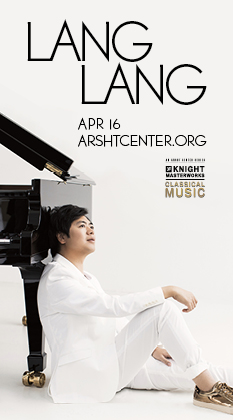Firebird Orchestra makes its first flight
It’s safe to say that few chamber orchestras are born in an opera rehearsal studio that has been converted into a nightclub cabaret with cash bar. But the Firebird Chamber Orchestra is not just any ensemble. Patrick Dupre Quigley has achieved great success with his choir Seraphic Fire by doing smart, adventurous programs that consistently defy expectations.
The same qualities would appear to apply to the young conductor’s new venture, the Firebird Chamber Orchestra. Backed by a $250,000 grant from the Knight Foundation, the ensemble is making its debut this weekend with three performances at the Arsht Center for the Performing Arts.
Friday night’s concert at the Peacock Rehearsal Hall in the Ziff Ballet Opera House offered a comfortable, informal atmosphere with the charismatic Quigley offering concise yet informative verbal program notes. Any fear that the club atmosphere would produce visual and aural distractions turned out to be unfounded. In fact, Friday night’s audience proved so perfectly attentive and respectful, the hall was quieter than some of Seraphic Fire’s church performances.
The in-the-round seating certainly offers an intimate concert experience with tables so close to the stage, one could tap Quigley on the shoulder. The mirrored wall adds a neat double perspective, offering a front view of the conductor from the musicians’ vantage point.
But while the space worked well enough practically, acoustically it proved problematic. The Peacock space may be fine for rehearsing voices but it is a bone-dry room with no ambient warmth, throwing a merciless glare on every note played by the 13-member string ensemble. Quigley’s players are skillful enough to withstand such exposure, but there’s no denying that the arid acoustic provided little bloom to a corporate string tone that at times emerged thin and wiry.
The premiere program of Baroque and 20th- century American works for strings was characteristically enterprising. Quigley once again showed that he is just as inspirational a conductor with orchestra as with singers, directing with precise economy, cuing entrances and transitions clearly, and keeping a consistent rhythmic pulse.
The opening Vivaldi concerto from L’Estro Armonico (No. 10, RV 580) offered a sampler of Quigley’s historically minded Baroque approach with sparing vibrato and light bowing. Co-concertmaster Michael Albert led his fellow violinists effectively, displaying admirable articulation in the virtuosic solo passages.
Like Richard Strauss, Georg Philipp Telemann composed a programmatic work on Don Quixote. Telemann can be the dull uncle of the Baroque, yet his Burlesque de Don Quixotte in French style shows surprising wit and ingenuity. A sprightly overture is followed by six movements painting various episodes from Cervantes’ novel, such as the upward string figures for Sancho Panza being tossed about in a blanket and the swooning strings representing the knight errant’s love for Dulcinea.
The music could have smiled more and the wry instrumental effects punched across more vividly at times. Yet for the most part Quigley led an attentive well-played rendering mindful of period style, that made a worthy case for Telemann’s rarely heard suite.
Performing Samuel Barber’s String Quartet in an ensemble arrangement was a fine idea, as the restless agitation and pensive unease of the outer movements provides context and a layered tragic depth to the celebrated Adagio centerpiece. Quigley directed this deeply felt music with clear-eyed sensitivity, taking the Adagio at a flowing, unsentimental pace that made it more moving for shearing off the schmaltz. Though well played by the Firebird members, one wanted more body of tone and presence from the violins.
The continuing neglect of so many leading 20th-century American composers who are not lucky enough to be Elliott Carter borders on scandal. Kudos to Quigley for programming music of David Diamond, one of our most inexplicably overlooked masters.
Diamond’s Rounds for String Orchestra from 1944 is lighter in expression than much of his wartime music, but one could hardly wish for a more engaging introduction to the composer’s art. In three short movements, Rounds presents a down-home country-fiddling expression, cast in the contours of folk music even though no actual melodies are quoted. The music displays Diamond’s sophisticated hand with string writing and an urbane touch without sacrificing affection for the populist style.
The brilliant Allegro vigoroso finale should go like the wind, but felt a bit cautious and reined in Friday night. Otherwise, Quigley and his players gave Rounds superb advocacy, playing with rhythmic bite, keeping the intricate counterpoint and shifting rhythms clearly defined and bringing just the right sense of stoic Midwestern melancholy to the central Adagio.
Patrick Dupre Quigley conducts the Firebird Chamber Orchestra 7 p.m. Sunday at the Arsht Center’s Ziff Ballet Opera House in the Peacock Rehearsal Studio. $40. 305-949-6722; www.arshtcenter.org.
Posted in Performances
Leave a Comment
Sat Oct 11, 2008
at 10:10 pm
No Comments





